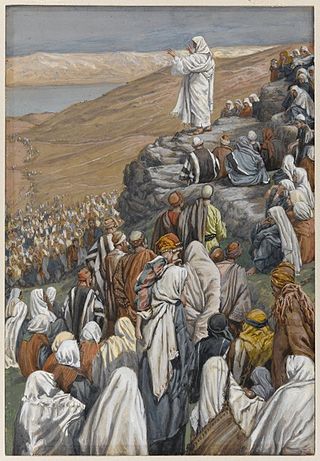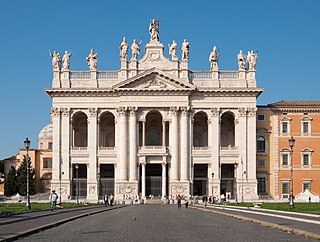
Mere Christianity is a Christian apologetical book by the British author C. S. Lewis. It was adapted from a series of BBC radio talks made between 1941 and 1944, originally published as three separate volumes: Broadcast Talks (1942), Christian Behaviour (1943), and Beyond Personality (1944). The book consists of four parts: the first presents Lewis's arguments for the existence of God; the second contains his defence of Christian theology, including his notable "Liar, lunatic, or Lord" trilemma; the third has him exploring Christian ethics, among which are cardinal and theological virtues; in the final, he writes on the Christian conception of God.
Theological virtues are virtues associated in Christian theology and philosophy with salvation resulting from the grace of God. Virtues are traits or qualities which dispose one to conduct oneself in a morally good manner. Traditionally the theological virtues have been named faith, hope, and charity (love). They are coupled with the four natural or cardinal virtues, and opposed to the seven deadly sins.

Francis August Schaeffer was an American evangelical theologian, philosopher, and Presbyterian pastor. He co-founded the L'Abri community in Switzerland with his wife Edith Schaeffer, née Seville, a prolific author in her own right. Opposed to theological modernism, Schaeffer promoted what he claimed was a more historic Protestant faith and a presuppositional approach to Christian apologetics, which he believed would answer the questions of the age.
Christian reconstructionism is a fundamentalist Calvinist theonomic movement. It developed primarily under the direction of R. J. Rushdoony, Greg Bahnsen and Gary North and has had an important influence on the Christian right in the United States. Its central theme is that society should be reconstructed under the lordship of Jesus in all aspects of life. In keeping with the biblical cultural mandate, reconstructionists advocate for theonomy and the restoration of certain biblical laws said to have continued applicability. These include the death penalty not only for murder, but also for idolatry, homosexuality, adultery, witchcraft and blasphemy.
Dominion theology, also known as dominionism, is a group of Christian political ideologies that seek to institute a nation governed by Christians and based on their understandings of biblical law. Extents of rule and ways of acquiring governing authority are varied. For example, dominion theology can include theonomy but does not necessarily involve advocacy of adherence to the Mosaic Law as the basis of government. The label is primarily applied to groups of Christians in the United States.

Robert Charles Sproul was an American Reformed theologian, Christian apologist, and ordained pastor in the Presbyterian Church in America. He was the founder and chairman of Ligonier Ministries, and could be heard daily on the Renewing Your Mind radio broadcast in the United States and internationally. Under Sproul's direction, Ligonier Ministries produced the Ligonier Statement on Biblical Inerrancy, which would eventually grow into the 1978 Chicago Statement on Biblical Inerrancy. Along with Norman Geisler, Sproul was one of the chief architects of the statement. Sproul has been described as "the greatest and most influential proponent of the recovery of Reformed theology in the last century."

Peter John Kreeft is a professor of philosophy at Boston College and The King's College. A convert to Catholicism, he is the author of over eighty books on Christian philosophy, theology and apologetics. He also formulated, together with Ronald K. Tacelli, Twenty Arguments for the Existence of God in their Handbook of Christian Apologetics.
Norman Leo Geisler was an American Christian systematic theologian, philosopher, and apologist. He was the co-founder of two non-denominational evangelical seminaries.
Francis J. "Frank" Beckwith is an American philosopher, professor, scholar, speaker, writer, and lecturer.

Christian ethics, also known as moral theology, is a multi-faceted ethical system. It is a virtue ethic, which focuses on building moral character, and a deontological ethic which emphasizes duty. It also incorporates natural law ethics, which is built on the belief that it is the very nature of humans – created in the image of God and capable of morality, cooperation, rationality, discernment and so on – that informs how life should be lived, and that awareness of sin does not require special revelation. Other aspects of Christian ethics, represented by movements such as the social Gospel and liberation theology, may be combined into a fourth area sometimes called prophetic ethics.
The Church Growth movement is a movement within evangelical Christianity which aims to grow churches based on research, sociology, analysis, etc. The Church Growth movement sees its origins in the Great Commission, and seeing people come to the knowledge of Christ. Donald McGavran, a seminal figure in the movement, asserted that "It is God's will that women and men become disciples of Jesus Christ and responsible members of Christ's church".

Christian literature is the literary aspect of Christian media, and it constitutes a huge body of extremely varied writing.
Christian feminism is a school of Christian theology which uses the viewpoint of a Christian to promote and understand morally, socially, and spiritually the equality of men and women. Christian theologians argue that contributions by women and acknowledging women's value are necessary for a complete understanding of Christianity. Christian feminists are driven by the belief that God does not discriminate on the basis of biologically determined characteristics such as sex and race, but created all humans to exist in harmony and equality regardless of those factors. On the other hand, Christian egalitarianism is used for those advocating gender equality and equity among Christians but do not wish to associate themselves with the feminist movement.
Frank Schaeffer is an American author, film director, screenwriter, and public speaker. He is the son of theologian and author Francis Schaeffer. He became a Hollywood film director and author, writing several novels depicting life in a strict evangelical household including Portofino, Zermatt, and Saving Grandma.
Mark of the Christian is a work by Francis Schaeffer concerning the spiritual life of the Bible.
Catholic moral theology is a major category of doctrine in the Catholic Church, equivalent to a religious ethics. Moral theology encompasses Catholic social teaching, Catholic medical ethics, sexual ethics, and various doctrines on individual moral virtue and moral theory. It can be distinguished as dealing with "how one is to act", in contrast to dogmatic theology which proposes "what one is to believe".
Christianity and abortion has a long and complex history. There is scholarly disagreement on how early Christians felt about abortion. Some scholars have concluded that early Christians took a nuanced stance on what is now called abortion, and that at different and in separate places early Christians have taken different stances. Other scholars have concluded that early Christians considered abortion a sin at all stages; though there is disagreement over their thoughts on what type of sin it was and how grave a sin it was held to be. Some early Christians believed that the embryo did not have a soul from conception, and consequently opinion was divided as to whether early abortion was murder or ethically equivalent to murder. Some early Christian texts nonetheless condemned abortion without distinction: Luker mentions the Didache, Clement of Alexandria, Tertullian, and Saint Basil. Early church councils punished women for abortions that were combined with other sexual crimes, as well as makers of abortifacient drugs, but, like some early Church Fathers such as Basil of Caesarea, did not make distinction between "formed" and "unformed" fetuses.
Protestant views on contraception are markedly more pluralistic than the doctrine expressed by the Magisterium of the Catholic Church, due to historical divergences of theological thought that began during the Protestant Reformation, including the rejection of an infallible doctrinal authority other than Scripture. The doctrine of various forms of Protestantism as a whole from the Reformation until 1930 strongly condemned contraception as the Catholic Church does, but such opposition has since almost totally been dropped. Since the 1930 Seventh Lambeth Conference of the Anglican Communion, major mainline Protestant denominations shifted their doctrine to accepting contraception. In general, most liberal Protestants, such as the United Church of Christ, hold relatively settled views that accept the use of contraception, while conservative evangelicals denominations mostly also accept the use of contraception; however, some evangelicals are divided on the issue, with a small minority of denominations seeing natural family planning as the only permissible method. Other traditions such as Laestadian Lutheran Churches, do not permit the use of birth control and may teach Quiverfull doctrine, which holds that Christians should have large families.

The Latin Church is the largest autonomous particular church within the Catholic Church, whose members constitute the vast majority of the 1.3 billion Catholics. The Latin Church is one of 24 churches sui iuris in full communion with the pope; the other 23 are collectively referred to as the Eastern Catholic Churches, and have approximately 18 million members combined.

Billy Zeoli was an American evangelical leader, speaker and media executive from Grand Rapids, Michigan. Zeoli served as the White house chaplain to U.S. President Gerald R. Ford and Betty Ford during the mid-1970s offering counsel on national spiritual matters, and acting as spiritual counselor to President Ford. In the 1960s, Zeoli was an early organizer of what would become Baseball Chapel, a Christian organization that provides professional Baseball players, and other athletes, Sunday church services in their locker rooms before sporting events. Zeoli was perhaps most remembered as the long-standing president of Gospel Films Inc, later becoming Gospel Communications Inc, a leading Christian media company that distributed media and promoted ministry outreach around the world. Zeoli held the position from 1962 until he retired from the organization in 2006.







